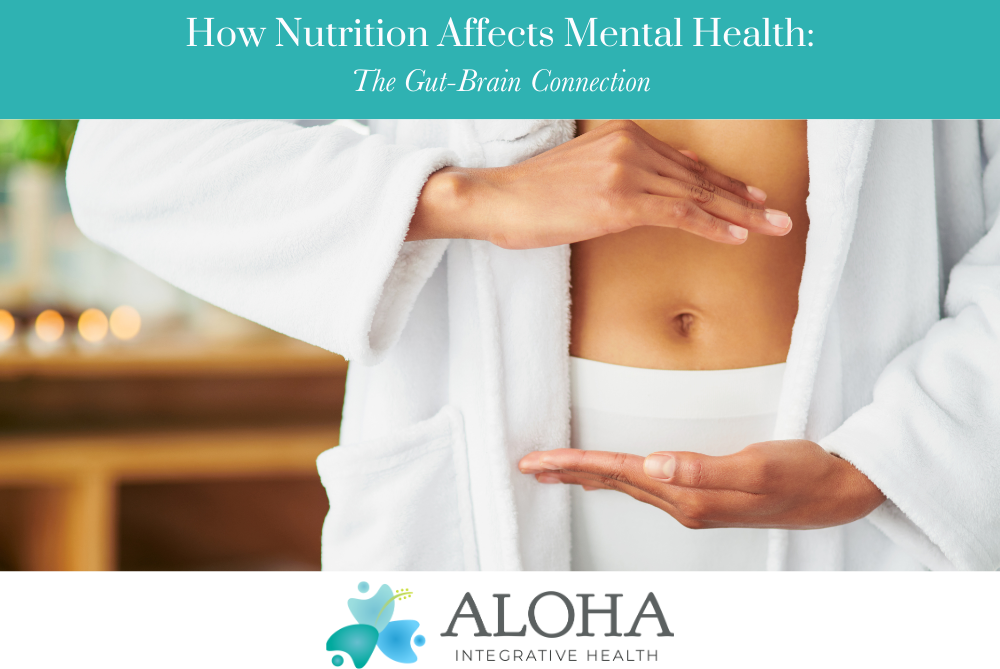Understanding the Gut-Brain Connection
Have you ever felt butterflies in your stomach before an important event? Or noticed that stress sometimes leads to digestive discomfort? These experiences illustrate the profound connection between the gut and the brain, often referred to as the gut-brain axis. This bidirectional communication system links our digestive system to our central nervous system, playing a crucial role in mental health.
At Aloha Integrative Health, we emphasize a holistic approach to wellness, addressing both physical and mental health through functional medicine. One of the most critical factors influencing this connection is nutrition. The food we consume has a direct impact on our gut microbiome, which, in turn, affects mood, cognitive function, and overall mental well-being.
The Role of the Gut Microbiome in Mental Health
The gut microbiome is a vast ecosystem of trillions of bacteria, fungi, and other microorganisms residing in our intestines. This microbiome is responsible for several essential functions, including digestion, immune support, and neurotransmitter production.
Key Ways the Gut Microbiome Influences Mental Health:
- Neurotransmitter Production – The gut produces about 95% of the body’s serotonin, a neurotransmitter that regulates mood, sleep, and appetite. A healthy gut microbiome helps maintain balanced serotonin levels, reducing the risk of depression and anxiety.
- Inflammation Regulation – Poor gut health can lead to chronic inflammation, which has been linked to mental health disorders like depression and schizophrenia.
- Stress Response – A balanced gut microbiome supports a healthy response to stress by regulating cortisol, the body’s primary stress hormone.
- Nutrient Absorption – The gut processes and absorbs essential nutrients such as B vitamins, omega-3 fatty acids, and magnesium, all of which play a role in brain function and mental stability.
Nutritional Strategies for a Healthy Gut and Mind
The food you eat can either support or disrupt the gut-brain connection. Incorporating gut-friendly foods into your diet can enhance mental well-being, while avoiding processed and inflammatory foods can prevent mood disturbances.
Foods That Support Gut and Mental Health:
- Probiotic-Rich Foods – Yogurt, kefir, sauerkraut, kimchi, miso, and kombucha promote beneficial gut bacteria.
- Prebiotic Foods – Garlic, onions, bananas, asparagus, and oats provide essential nutrients for beneficial gut bacteria.
- Omega-3 Fatty Acids – Found in salmon, flaxseeds, and walnuts, omega-3s reduce inflammation and support brain health.
- Fermented Foods – These help introduce beneficial bacteria into the gut and improve digestion.
- Leafy Greens – Spinach, kale, and other greens provide fiber and antioxidants that promote a healthy gut microbiome.
- Whole Grains – Brown rice, quinoa, and whole wheat support gut bacteria and provide lasting energy for brain function.
Foods That May Harm the Gut-Brain Connection:
- Processed and Sugary Foods – High sugar intake can lead to gut dysbiosis (an imbalance of gut bacteria) and mood swings.
- Artificial Sweeteners – These may negatively alter the gut microbiome and contribute to anxiety or depression.
- Excessive Alcohol – Can disrupt gut bacteria and lead to inflammation, impacting mood and cognitive function.
- Highly Processed Fats and Oils – Trans fats and excessive saturated fats can lead to gut inflammation, which may impact mental health.
Lifestyle Factors That Support Gut and Mental Health
In addition to nutrition, certain lifestyle choices can optimize both gut and mental health:
- Regular Exercise – Physical activity supports a diverse gut microbiome and reduces stress and anxiety.
- Adequate Sleep – A consistent sleep schedule helps regulate the gut-brain connection.
- Mindfulness and Stress Reduction – Meditation, deep breathing, and relaxation techniques help balance gut bacteria and reduce stress-related inflammation.
- Hydration – Drinking plenty of water supports digestion and detoxification.
Comprehensive Q&A Section
Q: How quickly can dietary changes improve mental health?
A: While immediate effects may be subtle, significant changes in mood and mental clarity can be observed within a few weeks of maintaining a gut-friendly diet. Long-term benefits require sustained nutritional habits.
Q: Can probiotics help with anxiety and depression?
A: Yes! Studies have shown that probiotics, especially Lactobacillus and Bifidobacterium strains, can reduce symptoms of anxiety and depression by balancing gut bacteria and influencing neurotransmitter production.
Q: What are some signs of an unhealthy gut affecting mental health?
A: Symptoms may include:
- Frequent bloating or digestive issues
- Mood swings, anxiety, or depression
- Brain fog or difficulty concentrating
- Low energy or chronic fatigue
- Poor sleep quality
Q: Are there any supplements that support gut and mental health?
A: Yes, some beneficial supplements include:
- Probiotics – To replenish good gut bacteria
- Prebiotics – To nourish gut bacteria
- Omega-3 Fatty Acids – To reduce inflammation and support brain health
- Magnesium – To promote relaxation and reduce stress
- Vitamin D – Essential for mood regulation and immune health
Q: Can stress negatively impact the gut-brain connection?
A: Absolutely! Chronic stress can disrupt gut bacteria, leading to inflammation, poor digestion, and an increased risk of anxiety and depression. Stress management techniques, like yoga and meditation, can help maintain a balanced gut microbiome.
Q: How does hydration play a role in gut and mental health?
A: Staying hydrated helps with digestion, nutrient absorption, and detoxification. Dehydration can lead to brain fog, irritability, and increased stress levels.
Conclusion
The gut-brain connection is a powerful and complex relationship that highlights the impact of nutrition on mental health. By prioritizing a gut-friendly diet and making conscious lifestyle choices, you can support both your digestive and mental well-being.
At Aloha Integrative Health, we take a holistic approach to mental health, integrating nutrition, functional medicine, and lifestyle modifications to optimize your overall wellness. If you’re struggling with mood disorders, digestive issues, or general well-being concerns, our team is here to help.
Contact Aloha Integrative Health:
📍 Address: 4510 Executive Drive, Suite 108, San Diego, CA 92121
📞 Phone: (619) 333-3515
🌐 Website: alohaintegrativehealth.com
Take control of your gut and mental health today! Schedule a consultation to learn how our holistic and integrative approach can support your wellness journey.

